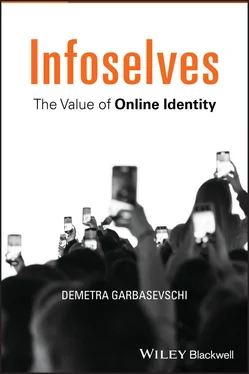144 137
145 138
146 139
147 140
148 141
149 142
150 143
151 144
152 145
153 146
154 147
155 148
156 149
157 150
158 151
159 152
160 153
161 154
162 155
163 156
164 157
165 158
166 159
167 160
168 161
169 162
170 163
171 164
172 165
173 166
174 167
175 168
176 169
177 170
178 171
179 172
180 173
181 174
182 175
183 176
184 177
185 178
186 179
187 180
188 181
189 182
190 183
191 184
192 185
193 186
194 187
195 188
196 189
197 190
198 191
199 192
200 193
201 194
202 195
Introduction
A Moment in Time and Our Self-Identity Dilemma
Over the course of our lives, we experience moments that have the power to bring us sudden clarity and insight over aspects of our lives that we had misunderstood, misinterpreted, or simply failed to notice. As a global society, we are equally exposed to moments of collective revelation that fracture the status quo, opening new perspectives and courses of action. These are not necessarily moments of historical magnitude and can be as mundane as the last day of April 2019.
It was the day of the Facebook F8 developer conference, an event dedicated to tech creators and consumers, where the company usually introduces its latest technological updates, pitching product novelties or proprietary tools to reaffirm its position as leader and innovator. The edition of 2019 announced itself to be remarkably different. Facebook had been under a long siege following the Cambridge Analytica scandal. Since the reveal of Facebook’s part in one of the biggest political campaign schemes of our times, the accusations toward the company had been cascading. In retrospect, the known offences fell under at least three categories. First, there were the unintended errors in personal data handling. Various bugs allowed the hacking of 30 million accounts in September 2018 or the open availability of the private photos of almost seven million users to third-party developers in December 2018 (Lapowsky 2018). Then, there was the intentional third-party data sharing. In December 2018, Facebook’s alleged secret deals with over one hundred and fifty major companies, among which Amazon, Spotify, and Netflix, were made public. Under these contracts, Facebook was deceitfully unlocking the private data of users for its partners’ use (Dance et al. 2018). Finally, there was the lenience towards the use of the platform, allowing for the spread of fake news, hate speech, or the congregation of individuals and groups with a shady agenda, leading to tragedies such as the violent street riots targeting Rohingya Muslims in Myanmar (Lapowsky 2018). The company’s image had been suffering hit after hit, culminating in Mark Zuckerberg’s appearance before US Congress. In 14 years since the creation of Facebook – the online social network that changed the way individuals interact and engage in social relationships worldwide – this was the first significant attempt to define and attribute accountability. Zuckerberg’s unprecedented testimony was interpreted in many ways at the time. What is nevertheless visible to anyone watching the recording on YouTube is that it evokes both humanistic intentions and unsettling acts of power. By F8, the list of Facebook’s known offences had become so long and so grim, causing disruptions to the company’s financial indicators, that amends were vital. Mark Zuckerberg chose to play a risky card, one he had recently been toying with. In his keynote address on the first day of the F8 conference, he promised to completely rewire Facebook around the very thing it was accused of lacking: privacy. A new commitment (a private future for its users) and a poetical claim (“privacy gives us the freedom to be ourselves”) pointed to Facebook’s rewritten mantra.
No matter if we choose to believe or disbelieve Zuckerberg’s announcement regarding the intention to redefine his company around the value of privacy, we cannot ignore the historical significance of the moment. Facebook’s leader was publicly cornered into an unprecedented move; his was the only possible response to appease (even if temporarily) the snowball effect of recent revelations. In many ways, affirming the new objective of Facebook legitimized a cultural tension that had been building up around the idea of privacy in the age of hyperconnectivity, to the point of transforming privacy into a societal turning point. Two explanations seem necessary here. On the one hand, it should be clarified that we are referring to informational privacy – the “freedom from informational interference or intrusion, achieved thanks to a restriction on facts … that are unknown or unknowable” about someone (Floridi 2014a, p. 103). On the other hand, we should not forget that privacy is a social construct, like freedom, justice, or power. As such, it can be understood differently by different people, in different circumstances. In a post-Internet society, it is logical to assume that ideas and expectations of informational privacy have changed from those we held before our collective datafication. Digital technologies of connectivity can be deployed to both decrease and increase informational friction, making personal information more available or less so (depending on knowledge and intent), and therefore both eroding and enhancing informational privacy (2014a). The cultural tension mentioned earlier is the result of our failure to project the consequences of this dual role. Our frontstage experience with being empowered to exert certain levels of control over our personal information online has prevented us from observing the systematic informational intrusion that unfolded backstage.
Since the emergence of social media, users have chosen to share information about themselves in an environment that they knew little about. It was not unreasonable to assume their personal data belonged to them, or at least that it was treated with care since, through their structural organization, platforms gave the impression of a controlled type of sharing. Users did not spend too much of their time questioning this assumption. The reality we have been confronted with in recent years is that we could not have been more wrong. Once released online, our personal information is no longer ours. What is more, our data does not consist solely of the information we have historically uploaded and, theoretically, have the option to control. Online, we make hundreds of choices every day that speak about who we are. The data behind these choices is transparent to the platforms we interact on but remains invisible to us. The commercial system set in place by the Internet’s key players has benefited abundantly from this loophole, while we have had no knowledge about how our personal information was collected, interpreted, or repurposed. Connecting online personal information to offline real individuals has become the founding principle of a new economic system: the identity economy, allowing for the commodification of identity at a scale never encountered before. The mass harvesting of personal information online was possible through a methodical erosion of our informational privacy. Not only have the Cambridge Analytica and similar reveals altered our collective experience of privacy (we now, for example, expect constant surveillance online), but they have also pointed out that an erosion of informational privacy can be perceived as a direct attack on our self-identity, as our online identities are unquestionably constituted by our information.
While we benefited from legal frameworks protecting our identities in the real world, the territory of our online identities represented, until recently, a vast and unchartered gray area. The need to create effective regulation to safeguard our identities in the online environment became increasingly pressing once mass claims to our online identities made by various entities were undeniably exposed. In 2012, the European Union (EU) Commission was assembling a think tank and research group called the “Onlife Initiative.” Its members, reputed thinkers of our time, had the mission to advise the EU in the formulation of its digital strategy, assessing the impact of information and communication technologies on individuals and society and setting the ground for future policy. The product of this collective effort, synthesized in a document titled “Onlife Manifesto” (Floridi 2014b), pointed to our irreversible digital transformation. The word “onlife” itself, a term coined by Luciano Floridi (2011), is revealing of the way information and communication technologies have altered the fabric of our living environment and through it, the nature of our very existence. In a hyperconnected world, we are never totally on nor completely off . Consequently, our identities are inevitably constructed and performed within this merged informational environment that has unnoticeably become our natural habitat. The “Onlife Manifesto” had signaled the need to adjust our conceptual framework to a new reality, before any legal framework could be imagined and implemented.
Читать дальше











